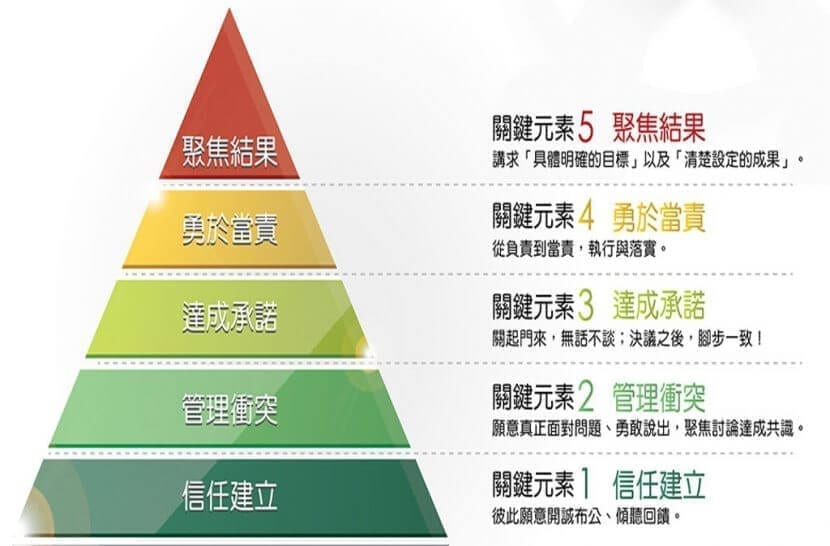
Author: Yang Gongmao, expert in the implementation of team building culture and senior consultant of Kang Shiteng
day
On a business trip to the mainland, in the airport waiting room, I heard three business people behind me discussing business enthusiastically, although I had no intention of eavesdropping, but the volume of their chat should not care if someone eavesdropped, I had no choice but to "participate" in their conversation. One of the older men said in annoyance, "I don't know what the boss was thinking, how do I know what he meant by all those details!" and his two other colleagues echoed in unison, complaining and complaining! (I turned my head to see the age and dress of the three, and I guessed that they were all supervisors.) )
Hearing such conversations has a very familiar feeling, and it seems to happen all around us, whether it is at work or in life. When I was conducting training, I often had trainees raise similar concerns about the elusiveness of their boss's decisions. The content of this conversation between these three business people can be tried to deduce why:
(1) The boss is a master in the world, and his thoughts are superior, so ordinary people can't understand it...
(2) The boss is serious about his thoughts, but he doesn't have the intention of listening to them...
(3) The boss is very serious about his thoughts, and the listeners are also interested, but they are not at the right frequency with each other
(4) The boss doesn't know what to do, so he can't say it clearly, and the more the listener listens, the more panicked he becomes
(5)⋯⋯
Regardless of their boss's expectations, the three supervisors were clearly irritable and speculated. More importantly, the content of their dialogue has been mixed with emotions, and the execution is bound to be greatly reduced! In the end, it becomes a policy and a countermeasure, and everyone's goal is not to do things right, but how to avoid this catastrophe... The mutual suspicion between the boss and his subordinates, the turnover rate of personnel, etc., can be said to have a huge impact on the company!
Master the 5 keys to team building to improve effective corporate communication
In the operation of the enterprise, we communicate every day, but there are often gaps that are not connected, and such a situation actually has its root cause, and it does not happen suddenly. Based on the best-selling book by Dr. Patrick Lencioni, a well-known American business manager, the structure of the five barriers to team leadership can provide a good solution to the above-mentioned organizational malfunctioning. According to Dr. Lanchioni, there are five structural reasons why an organization can function inefficiently and produce poorly, in order: loss of trust, fear of conflict, lack of commitment, evasion of responsibility, and neglect of results. These five structural levels explain the above case:
Loss of trust – These three business people and their bosses do not dare to expose themselves to their incomprehension in front of their bosses due to their lack of trust.
Fear of conflict – not understanding what the boss is saying and not daring to ask questions or challenges to the boss (this may be based on bad past experiences...) , losing the opportunity for full discussion and confirmation.
Lack of commitment – As the meeting did not dare to ask for further clarification, the conclusions of the meeting had to be reversed, resulting in a low level of commitment.
Avoidance of Responsibility – Due to the lack of commitment, if the implementation process goes wrong, there will only be kicking the ball and avoiding their own responsibility.
Ignoring results – By discharging responsibility for poor execution, everyone's main focus is on how to keep themselves (or their departments) safe from misfortune, and they are indifferent to the results of the organization's operations.
From the above five structural factors, the occurrence of poor communication in an organization is not a single event, but the result of a structural failure in the operation of the organization. Therefore, the real responsibility is actually each partner of the team, including the boss with the heaviest responsibility! To improve the results of poor communication, it is as simple as sitting down with each other to communicate, but it is a major project that requires the time and effort of each partner in the team:
Build trust – teams are willing to open up and self-reveal each other, and only by truly knowing and understanding each other can we have the opportunity to build honest trust.
Mastering Conflict - When the team's trust is enough, in any discussion and meeting situation, each other will have no scruples to share their thoughts and doubts, and will not avoid possible arguments or be scolded for questioning the boss's ideas, so that the team's conflict of opinions will occur naturally, and only then will there be a chance to master the conflict or even cross the conflict.
Face up to the commitment - when each partner is willing to speak their minds and each other's positions are fully respected, they are naturally willing to commit to the conclusions of the meeting and implement them conscientiously.
Team responsibility - because the commitment of team members is high enough, they not only care about whether they do their part well, but also pay attention to whether the other partners in the team are serious about implementation, and each partner is willing to remind each other and back-up each other for any behavior or situation that affects the results!
Result-oriented - When partners truly become a One Team, each other values the final collective results, and the achievement of the overall organizational goals is the only focus of each person.

Gather the centripetal force of the team and open the beautiful vision of the organization
There are no shortcuts to building a high-performing team, and it takes everyone seriously. Fortunately, the five ways of building a team mentioned above are not very difficult, and even have familiar connotations. However, the challenge is that many organizational leaders focus on quantitative goals such as rules and regulations and performance figures, while ignoring qualitative goals such as cohesion and consensus. Because of ignoring the elements that need to be focused on building a team, although the team may be able to achieve good performance because of high bonuses, mastery of key technologies, or betting on market and customer needs, if it is not supplemented by building strong team cohesion, these performances will only be "opportunity money", that is, such high performance will not be sustainable, and once it encounters any variables (such as stronger competitors, key members leaving, overall economic fluctuations), such a team is very likely to collapse.
In recent years, the Taiwan market is not booming, and it is common to hear that the boss hopes that employees can "share the difficulties" together, however, the real key is that the "community difficulties" are voluntary or passive? If it is a strong team that truly trusts each other, I believe that without waiting for the boss to speak, employees will naturally take the initiative to think about the next step of the organization, and if necessary, everyone will be willing to limit part of their own benefits and accompany the organization to tide over the difficulties, because everyone cares about the long-term development of the organization, rather than their own small profits. Is it easy to build such a beautiful organization? Actually, it is not easy, but as long as you want to, you and my organization have the opportunity to create such a team, and once you start, the team will slowly grow stronger and stronger, like a plant irrigated by water.
When I heard the boarding announcement, the three men, who were a little excited, were still talking about how the next day's meeting would go with a look of distress, and I can only wish them a good time!
About the Author:
Yang Gongmao, expert in the implementation of team building culture / senior consultant of Kang Shiteng
 In recent years, he has frequently traveled back and forth between the two sides of the strait to assist the team in establishing leadership-related training for enterprises and government agencies, and is a well-known experiential training expert on both sides of the strait.
In recent years, he has frequently traveled back and forth between the two sides of the strait to assist the team in establishing leadership-related training for enterprises and government agencies, and is a well-known experiential training expert on both sides of the strait.

You must be logged in to post a comment.